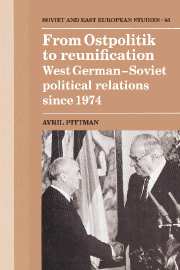Book contents
- Frontmatter
- Contents
- List of tables
- Preface
- Note on text
- Chronology
- Introduction
- 1 The Second World War and its aftermath, 1945–1974
- 2 Ethnic Germans
- 3 Berlin
- 4 The Federal Republic of Germany's relations with the German Democratic Republic
- 5 INF, Afghanistan and the post-Afghanistan period
- 6 Assessment of the Federal Republic of Germany's relations with the Soviet Union, 1974–1982
- 7 The Federal Republic of Germany's political relations with the Soviet Union after 1982
- Appendices
- A The Federal Republic of Germany's economic relations with the Soviet Union
- B The ‘Agreement on Developing and Deepening the Long-Term Co-operation between the Federal Republic of Germany and the Union of Soviet Socialist Republics in the Economic and Industrial Fields’ of 6 May 1978
- C The Federal Republic of Germany's foreign policy in the early 1980s
- Notes
- Bibliography
- Index
- Series list
B - The ‘Agreement on Developing and Deepening the Long-Term Co-operation between the Federal Republic of Germany and the Union of Soviet Socialist Republics in the Economic and Industrial Fields’ of 6 May 1978
Published online by Cambridge University Press: 12 October 2009
- Frontmatter
- Contents
- List of tables
- Preface
- Note on text
- Chronology
- Introduction
- 1 The Second World War and its aftermath, 1945–1974
- 2 Ethnic Germans
- 3 Berlin
- 4 The Federal Republic of Germany's relations with the German Democratic Republic
- 5 INF, Afghanistan and the post-Afghanistan period
- 6 Assessment of the Federal Republic of Germany's relations with the Soviet Union, 1974–1982
- 7 The Federal Republic of Germany's political relations with the Soviet Union after 1982
- Appendices
- A The Federal Republic of Germany's economic relations with the Soviet Union
- B The ‘Agreement on Developing and Deepening the Long-Term Co-operation between the Federal Republic of Germany and the Union of Soviet Socialist Republics in the Economic and Industrial Fields’ of 6 May 1978
- C The Federal Republic of Germany's foreign policy in the early 1980s
- Notes
- Bibliography
- Index
- Series list
Summary
On 6 May 1978 an agreement on developing and deepening the long-term co-operation between the FRG and the USSR in the economic and industrial fields was signed which came into force on 27 December. As Chancellor Schmidt pointed out, the agreement had of course been prepared by the two sides before the Brezhnev visit: at the press conference on 7 May 1978 Schmidt personally warned that the agreement should not be regarded as ‘having been born off the cuff, as it were’. Fred Oldenburg and Christian Meier write that Schmidt claimed to be the initiator of the agreement but that in fact Brezhnev had expressed great interest in such an agreement already during his first visit to Bonn in 1973.
The agreement was called a co-operation agreement, not a trade agreement. This meant that it was not subject to the EEC ruling that trade agreements might only be concluded with the Soviet Union by the Community and no longer bilaterally. Co-operation agreements were only subject to the requirement that the EEC be consulted. The agreement was a very broad framework agreement to be concretely filled out through further negotiations. It did not establish any new projects but was meant to give new impulse to trade and industry between the two states. It applied for twenty-five years but had an initial period of validity of ten years with the possibility of its being renewed three times for a period of five years each time.
- Type
- Chapter
- Information
- From Ostpolitik to ReunificationWest German-Soviet Political Relations since 1974, pp. 176 - 179Publisher: Cambridge University PressPrint publication year: 1992

